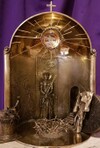The Meaning of Christ’s Life, Passion, and Death

Christ chose to have parents who were poor but perfect in virtue, lest anyone should glory in his noble lineage and the riches of his parents. He lived a life of poverty to teach others to spurn riches. He lived an ordinary life having no high position to recall others from an inordinate greed for honors. He endured labor, hunger, thirst and bodily scourging, lest those who are intent on bodily pleasures and delights draw back from the good of virtue because of the rigors of such a life.
In the end Christ endured death, that others might not abandon the truth for fear of death. And lest anyone should fear to undergo a shameful death for the truth, he himself chose the most shameful kind of death, namely, death on a cross. Thus it was fitting for the Son of God to take on human flesh and to suffer death, that by his example he might encourage us to pursue virtue. Peter attested to the truth of this, saying, Christ suffered for us, leaving you an example that you should follow in his footsteps.
If Christ had lived in the world in wealth and power and with a high position, it might have been thought that the purpose of his teaching and miracles was to curry human favor and power. Therefore, to make it clear that he was performing a work of divine power, Christ chose all that was low and weak in the world: a lowly mother, a life without riches, and uncultured disciples and messengers. Christ himself was to be rejected and condemned to death by the great ones of the world, to make it perfectly clear that the undertaking of his miracles and his teaching was not of human but of divine power.
From the theological works of Saint Thomas Aquinas.(De rationibus fidei, Ed. Leonina, t. 40, Romae 1969, pp. 56ss.).
Accessed from the Vatican Website.
